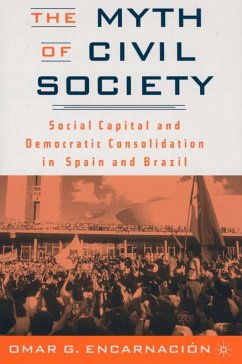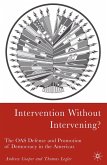Almost irrespective of the geographic setting, the debate about the future of democracy in post-authoritarian societies is increasingly tied to the strength of civil society. A strong civil society is thought to be crucial to the emergence of successful democracies while a weak civil society is deemed the cause of flawed or frozen democracies. Using contrasting evidence from Spain and Brazil, this study challenges these widespread assumptions about contemporary democratization. It argues that it is the performance of political institutions rather than the configuration of civil society that determines the consolidation of democratic regimes.
Hinweis: Dieser Artikel kann nur an eine deutsche Lieferadresse ausgeliefert werden.
Hinweis: Dieser Artikel kann nur an eine deutsche Lieferadresse ausgeliefert werden.
"The Myth of Civil Society is well worth reading for experts and undergraduates alike. On the one hand, it offers us careful, comparative case studies of Spain and Brazil. On the other, it offers us evidence that both our faith and our massive investments in civil society might be misplaced. Not everyone will agree with the author's arguments but all will benefit from exposure to them. From its title, to its final page, this book makes exceptionally engaging reading." - Nancy Bermeo, Professor of Politics, Princeton University
"A thought-provoking examination of the relationship between civil society development and democratization. Through illuminating case studies of Spain and Brazil, Encarnación cuts through the many accumulated myths about civil society and reaches provocative conclusions about the primary importance of efficient and stable political institutions for the development of social capital, civil society, and democracy. This is a significant and highlyuseful book." - Thomas Carothers, Carnegie Endowment for International Peace
"This excellent book presents a long overdue critique of the inflated and empirically unsubstantiated claims frequently made concerning the importance of civil society in the consolidation and qualitative deepening of democratic regimes. It correctly refocuses our attention on political institutions and actors as the key agents that forge the 'social capital' that helps to sustain democratic regimes, and itassesses empirical evidence (particularly from the paradigmatic contrasting cases of Spain and Brazil) that challenges the frequent
assertion that high aggregate levels of associational membership, per se, are crucial for the health of democracy. This book should be of considerable interest both to scholars, and to those in NGOs and government agencies involved in the encouragement of democracy around the world. It is a welcome antidote to the conventional wisdom that has been widely accepted in an uncritical and unwarranted manner in recent years." - Richard Gunther, Ohio State University
"A thought-provoking examination of the relationship between civil society development and democratization. Through illuminating case studies of Spain and Brazil, Encarnación cuts through the many accumulated myths about civil society and reaches provocative conclusions about the primary importance of efficient and stable political institutions for the development of social capital, civil society, and democracy. This is a significant and highlyuseful book." - Thomas Carothers, Carnegie Endowment for International Peace
"This excellent book presents a long overdue critique of the inflated and empirically unsubstantiated claims frequently made concerning the importance of civil society in the consolidation and qualitative deepening of democratic regimes. It correctly refocuses our attention on political institutions and actors as the key agents that forge the 'social capital' that helps to sustain democratic regimes, and itassesses empirical evidence (particularly from the paradigmatic contrasting cases of Spain and Brazil) that challenges the frequent
assertion that high aggregate levels of associational membership, per se, are crucial for the health of democracy. This book should be of considerable interest both to scholars, and to those in NGOs and government agencies involved in the encouragement of democracy around the world. It is a welcome antidote to the conventional wisdom that has been widely accepted in an uncritical and unwarranted manner in recent years." - Richard Gunther, Ohio State University








